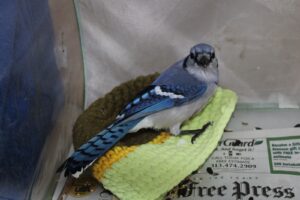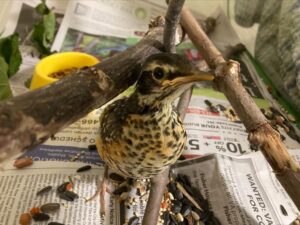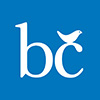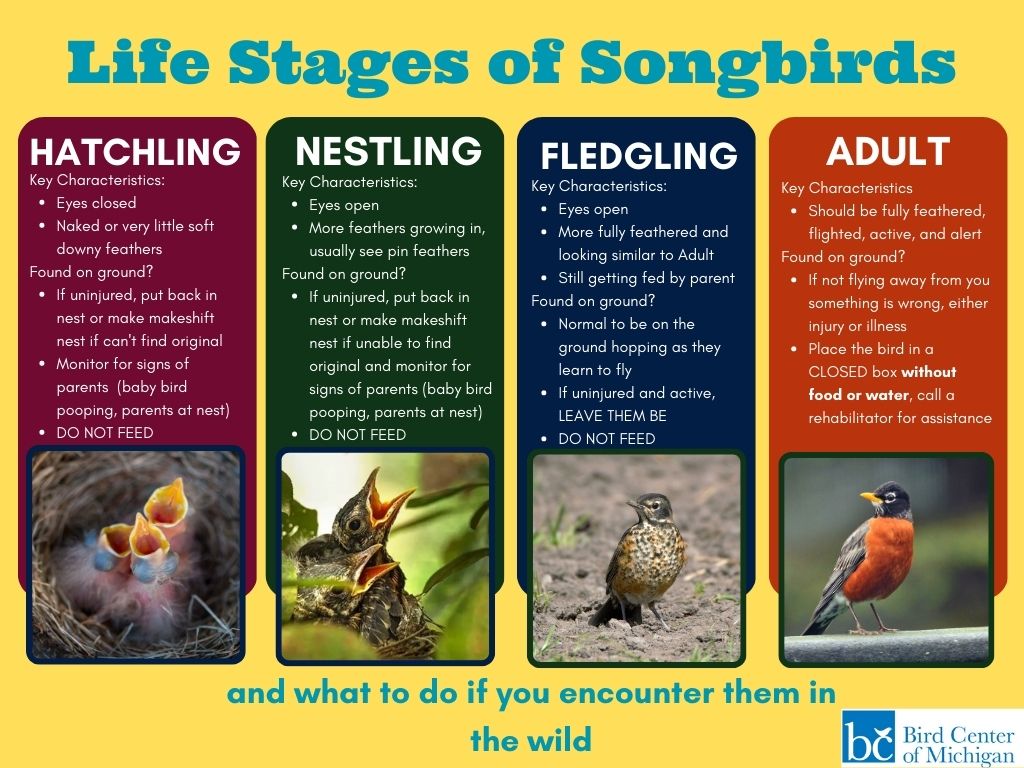If you have found an injured or orphaned bird, please text a photo of the bird, your county location, and a BRIEF description of the situation to 734.761.9640. Please do not bring a bird to the Bird Center without speaking to a staff member first.
If you have found a baby bird, please refer to this “Life Stages of Songbirds” chart for instructions (click to enlarge the image). You can call the Bird Center at 734.761.9640 for tips on renesting, making a makeshift nest, or determining if the bird needs to be brought in for rehabilitation. NEVER offer a baby bird food or water.
For non-emergencies, you can email our clinic staff at clinic@birdcentermi.org. Please do not email if you have an injured or orphaned bird needing assistance.
The Bird Center of Michigan strives to answer calls and texts right away. Please be patient if we do not answer your call right away, as we care for over 200 birds at a time during our busy baby season. We answer and respond to messages as fast as possible. While waiting for a response, please keep the bird in a box without any food or water. Do not attempt to give food or water to the bird. Do not release an injured bird.
For guided help on catching and transporting an injured or orphaned bird, check out this helpful video from Rehabilitation Supervisor Maria:
More About Our Services
At the Bird Center of Michigan, we wish we could help every single bird that is in distress. However, due to our limited staff and resources, we must set limitations on intakes. Our clinic has established a cap on invasive species such as Starlings, House Sparrows, and Pigeons. Invasive species have a negative impact on our delicate Michigan ecosystems. This cap allows us to accept more native species that will further help our environment. We can occasionally accept small waterfowl, such as mallards and gulls, for triage.
We often refer injured raptors and waterfowl to the Howell Nature Center in Livingston County – 517.548.5530. We also refer injured raptors to the River Raisin Raptor Center in Washtenaw County – 734.428.8455. For further help, please refer to the DNR list of licensed wildlife rehabbers: https://www2.dnr.state.mi.us/dlr/.
Head Injuries

When a bird sustains a head injury, the bird may be inactive or appear puffed up. Collision-case birds are often found under a window or beside a road. These birds require rehab assistance as soon as possible. Keep the injured bird in a closed box in a quiet area while you call for help. Do not offer the bird any food or water unless instructed to do so by a wildlife rehabber. It is important that injured birds come to the clinic immediately to be given pain medication, anti-inflammatory drugs, oxygen therapy, and any other medication needed. With an in-depth exam of the bird, we can then determine the next steps for rehabilitation and eventual release.
Windows are the leading cause of injury or death for birds, especially during migration. To help prevent collisions, home and business lights should be turned off at night to avoid attracting birds. We recommend using collision prevention products on your glass windows to deter collisions. It is important to place these products on the outside of your windows! Move bird feeders to within three feet of a window.
If you have found a deceased bird, you can contact the Detroit or Washtenaw Safe Passage organizations, which monitor collision birds and collect data on these cases.
Animal-Caught Birds
Although at times an animal-caught bird may not appear to be injured, all birds that have been in an animal’s mouth need to be brought into a licensed rehabilitator. Even the smallest of punctures can lead to life-threatening infections. Animal-caught birds are administered pain medication, antibiotics, and given proper wound cleaning in order to prevent infections. If not treated immediately, birds often succumb to their injuries or infection.
One of the most common causes of intake at the Bird Center of Michigan is cat-caught birds. Cat-caught birds are highly susceptible to infection due to harmful bacteria found in cat’s saliva. To protect native wildlife and the welfare of your cat, please keep house cats inside. Using a harness leash or a catio option is the safest and best for all.
Fledglings

Many people are surprised to learn that most native bird species leave the nest unable to fly. These young birds, called fledglings, remain on the ground for 5-10 days while their wings and legs become strong. Fledglings are able to flutter to low branches and bushes for safety at night. During this stage in their life, birds often fall prey to dogs, cats, children, well-meaning adults, cars, lawnmowers, etc. By learning about these young birds, we can determine if they are healthy fledglings or if they truly need help.
Fledglings should be able to walk or hop, and they should be covered with feathers. Watch the bird quietly from a distance for 4-6 hours. If during this time the parents arrive and feed the baby, all is well. Keep cats and dogs inside, and ask your neighbors to put theirs inside. Please be respectful of nature and let the wild be unless assistance is truly needed. The best place for a fledgling to learn is outside in nature with its parents monitoring close by.
Hatchlings and Nestlings
If the nest can be found and the bird does not appear to be injured, returning it to the original nest is the best option. If no nest is found nearby, a makeshift nest can be made. To make a nest, start by poking holes in a nest-sized Tupperware dish. This will allow for any water that accumulates to drain out the bottom. Then place some natural material such as leaves and grass in the nest to make it comfortable for the baby bird(s). Place the makeshift nest as close to the original nest as possible, preferably high up to avoid predation. Avoid moving the nest farther than 10 feet horizontally away from where you found the baby bird.
For guided help on renesting a baby bird, check out this helpful video from Rehabilitation Supervisor Maria:
It is extremely important that you do not offer baby birds any food or water as it can actually worsen their condition.
If the baby bird is cold, lethargic, or not opening its mouth to be fed, you should not return it to the nest. The parents will only feed young that open their mouths and beg for food. Call the clinic for advice immediately.
Inconvenient Nests
For humans, sometimes the most inconvenient spot for us is the most convenient for a bird searching for the perfect place to raise their young.
As a bird, finding the perfect spot to create a nest can be challenging. At times, these chosen spots might not seem the most convenient to us humans. During the nesting season, which is Spring and Summer, avoid removing trees and bushes if they do not pose a safety risk. Birds love to nest in trees and bushes to ensure plenty of cover for their babies. Removing them puts baby birds and their parents at unnecessary risk for injury or abandonment.
All native Michigan birds are protected under federal law. It is illegal to remove eggs and birds from an active nest. It is also illegal to rehab a native bird in your home without the proper permits. If you have questions or concerns regarding a nest, please contact the helpful and knowledgeable staff at the Bird Center.
Pesticides
Many songbirds, with the exception of doves, strive to feed their young a plethora of insects, grubs, and worms in order to raise strong, healthy babies. Sadly, these bird food items are often thought of as pests to us humans. Help both wildlife and your health by eliminating unnecessary pesticide use. If you are looking for a way to help reduce pesky mosquitoes in your yard, adding bat boxes to your yard is an excellent option. It is also helpful to change out water baths to prevent stagnant water.

